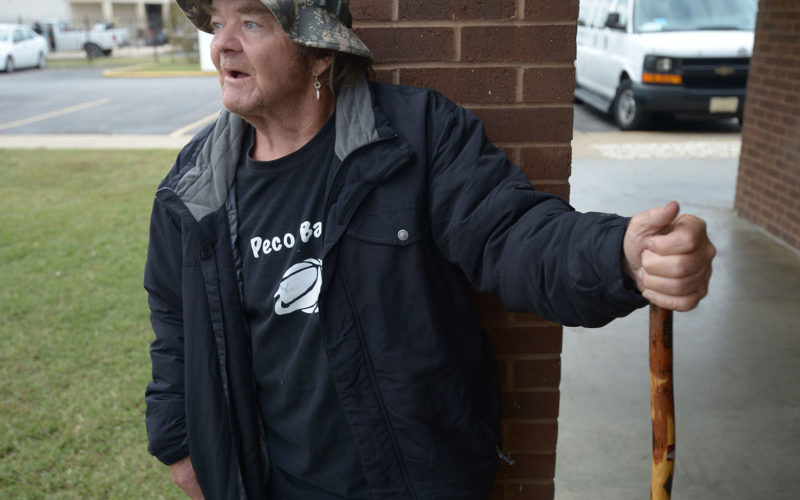Homeless life is harder when temperatures fall
STACY RYBURN
sryburn@nwadg.com
The coming of winter means extra preparation for the organizations serving homeless residents, but with the region’s largest campsite cleared last month, there’s added pressure on volunteers and staff members.
Many of the 100 or so people who were living in tents near 19th Street in Fayetteville now take overnight refuge at the Salvation Army. Others found housing through the U.S. Department of Veterans Affairs or 7 Hills Homeless Center. Some are still camping in spots in the city. The regional Continuum of Care, which works to get service providers on the same page, has helped coordinate relief.
The Salvation Army, in turn, opened up its emergency shelter for nightly use and expanded services.
For instance, dog kennels opened up earlier this month to accommodate pet owners. The organization is trying to hire more paid staff members. The shelter added 50 beds to its 26. Partnerships with organizations hosting events at the Town Center have provided untouched food, which would’ve otherwise been thrown away, to the people who need it most. Food recovery from events and restaurants is part of the city’s updated recycling plan adopted last year.
The operation at Salvation Army has run smoothly, but it’s been tough, said Josiah Davis, shelter director.
“Staffing is always a deal, but with the intake of everything, it has raised the bar as far as professional stress,” he said. “It’s definitely not been easy. But at the same time, my staff has done exceedingly well within their means.”
The shelter has a handful of people working every night to serve food and make arrangements for clients. About 40 people on average started staying overnight at the shelter once the camp was cleared, but with freezing temperatures, the number climbs, Davis said. A recent cold spate drew in nearly 70 men and women, he said.
The 80-degree temperatures the region experienced at the beginning of the month are over, said meteorologist Mike Teague with the National Weather Service in Tulsa, Okla. The good news, if anything, is meteorologists predict a relatively mild winter across the country. No part of the United States is favored to have an especially cold season.
That being said, living out in the elements is harmful regardless of the temperature, said Megan Hustings, director of the National Coalition for the Homeless, a research advocacy organization in Washington, D.C. People can suffer from hypothermia in 50-degree weather, and exposure exacerbates sickness or poor health conditions, she said.
The coalition estimates 700 people experiencing or at risk of homelessness in the United States die every year from hypothermia. The number is likely skewed, however.
“Almost every number that you’re going to hear about with homelessness is an undercount,” Hustings said.
For instance, the annual Point-In-Time surveys done nationwide are limited to the individuals volunteers can find. Many more people live in vehicles, or are staying with friends or family or at motels, and don’t get counted, Hustings said.
Last year’s count found just more than 550,000 to be homeless on one evening. The figure is probably closer to 3.5 million, by the coalition’s estimates.
Getting an accurate count is the first step in effectively ending homelessness in Northwest Arkansas, said Steve Burt, executive director of the Continuum of Care. The continuum is working with partner organizations to create a stable system with which to address the issue, he said.
The plan is threefold — shelter the unsheltered now, work with them to find a permanent home and house new unsheltered people rapidly. The system starts with setting up a by-the-name list of people who need help, Burt said.
Right now, the list identifies more than 1,000 individuals and 700 households in Northwest Arkansas. The list fluctuates monthly as situations change, but it gives the continuum a clear picture of the needs to tap the resources of nonprofit groups and the federal government, Burt said.
“Now that we know the exact amount of the problem, if you will, now we can start to build the resources to help those people,” he said. “We are at that tipping point where we know the data, and the data can show us how many people are coming into the system and how many people are exiting the system.”
A Northwest Arkansas nonprofit group, Serve NWA, agreed to buy about 5 acres owned by the University of Arkansas near 19th Street. The group plans to build microshelter housing at the site. University police evicted campers from the property Sept. 6.
Those 5 acres have been cleared, but some campers moved deeper into the woods. A developer may buy the other 50 acres and put in small, low-cost homes, but nothing is official yet.
Kenny Stone stood outside the Salvation Army on Thursday waiting for dinner to be served. He suffered a traumatic injury and walks with a cane. Stone said he’s been sleeping on a cot at the emergency shelter since it opened, and without that option, he’d likely be out in the woods somewhere.
Luckily, it hasn’t come to that, he said.
“People, they come over and volunteer to work, and work in the kitchen and cook and everything else for us,” Stone said. “The community is pulling together at this place right here.”
Oftentimes, unsheltered residents stay overnight at the Salvation Army and go to 7 Hills during the day. 7 Hills keeps some leftover winter supplies from the season before just to have something to start with, but the center needs donations, said Solomon Burchfield, director of operations.
Jackets, coats, long underwear, gloves and hats all are in demand, Burchfield said. Donations can be dropped off at the center. The Salvation Army could use cots to replace ones that are lost or damaged.
Winter is a challenge every year for the organizations trying to help, and especially for those who need the help, Burchfield said. He said he hopes fewer people living in the elements this season will take less of a toll.
“We all know how much we value our warm bed or hot soup or whatever our thing is,” Burchfield said. “It’s really hard for guys who are recuperating from something or who get sick to have to put up with staying outdoors.”
__
FYI
Donate
Several organizations, including those listed below, are helping the homeless in south Fayetteville and the region to find housing and other services. They need volunteers and donations.
• Salvation Army
219 W. 15th St.
Contact: (479) 521-2151 or salvationarmyaok.org/nwarkansas. Money donations are accepted online.
The organization has also asked for cots, food, plates and cutlery, and cleaning and personal hygiene products.
• 7 Hills Homeless Center
1832 S. School Ave.
Contact: (479) 966-4378 or 7hillscenter.org. Money donations are accepted online.
Winter items such as coats, jackets, gloves, hats and long underwear can be dropped off at the center.
•Genesis Church
205 Martin Luther King Jr. Blvd. Contact: (479) 442-1827 or centraltolife.com/genesis. Money donations are accepted online.






